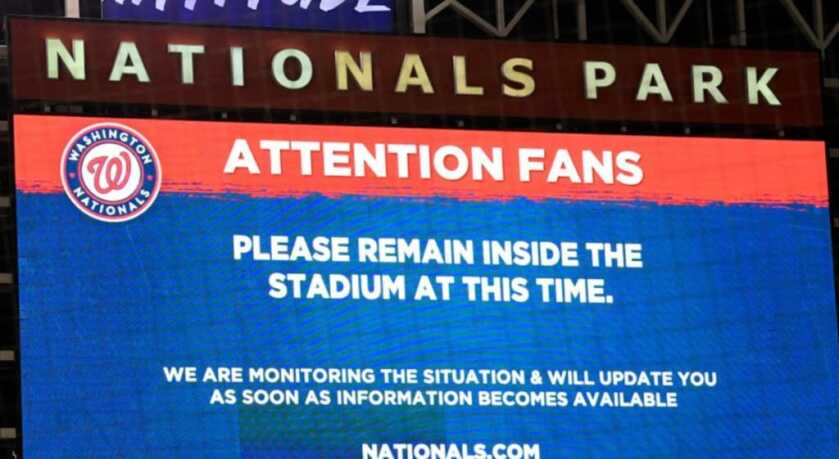
By Larry Keane
The nation’s attention was drawn to Washington, D.C., last weekend and not because of politics. Criminals exchanged gunfire right outside Nationals Park, the Major League Baseball stadium in the nation’s capital. Videos showed fans scrambling for the exits in fear and surveillance cameras captured the incident. Police are working leads to bring the perpetrators to justice, including two suspects who were among the three people injured.
It was just one of several recent acts of criminal violence in the District, including the shooting death of a 6-year-old and gunfire outside of a well-known high-end restaurant. The proximity of the stadium, though, to media elites who attended the game brought increased attention.
During a time of heightened criminal violence and a mayor and city council who support defunding the police, one thing remains crystal clear. Criminals ignore and break laws, despite Washington, D.C., having among the nation’s strictest gun control policies. Law-abiding D.C. residents are limited when it comes to options to exercise their Second Amendment rights to protect themselves.
Squeezing Gun Rights
For decades, law-abiding Washingtonians seeking to purchase a firearm were required to navigate a labyrinth of paperwork, complete permit registration documentation, pay exorbitant fees, register firearms and abide by purchasing limits per month. On top of that, there was only one location where a firearm could be transferred. Because that licensee was not a commercial firearm retailer that doesn’t actually sell guns, it only processed firearm transfers from outside jurisdictions. This forced Washingtonians to pay an additional $125 firearm transfer fee.
In an ironic twist of fate, the owner of that FFL called it quits in 2020, right at the point of rising crime during the coronavirus pandemic, because there was too much business coming through his door that he couldn’t keep up.
Washington, D.C., Mayor Muriel Bowser, who supported funding cuts to law enforcement and who never met a gun control policy she didn’t love, scrambled and announced the Metropolitan Police Department would take over the transfer duties.
In January 2021, two FFLs were granted their licenses in Washington, D.C. Both only transfer firearms and don’t sell firearms in the District.
Failed Gun Control Legacy
Washington, D.C., was at the center of one of the most consequential U.S. Supreme Court gun rights cases. The 2008 District of Columbia v. Heller challenged the District’s strict gun laws and in a landmark 5-4 decision, the late Justice Antonin Scalia wrote that the Second Amendment is, in fact, an individual right, independent of service in a state militia and protects the use of firearms for lawful purposes, including self-defense. The decision nullified D.C.’s existing handgun ban and law that firearms remain unloaded, disassembled and equipped with a trigger lock when in the home.
Restrictive gun laws are still in effect in Washington, D.C. Along with registration requirements, District gun owners are subject to universal background checks, must obtain a firearm license, can only possess ammunition for the firearm which has been registered with the Metro Police Department, must abide by magazine capacity restrictions, must endure a waiting period for firearms to be transferred and still face an outright ban on Modern Sporting Rifles (MSRs). Last year, Mayor Bowser signed a law banning home-built firearms, adding to the restrictions law-abiding gun owners must navigate and that criminals continue to ignore.
Meanwhile, carjackings in Washington, D.C., jumped 74 percent and police are deploying “bait cars.” This was revealed after two teen girls had charges dropped and one was sentenced for a fatal carjacking. A fourth suspect is still at large. The District has a no bail, no bonds policy where 90 percent of those arrested are turned out on the streets before trial.
Even more frustrating is that the police unions are calling out to be allowed to do their jobs and are instead being hamstrung. The Washington, D.C., police union tweeted after the criminal violence outside of Nats Park, “It is a tragedy that elected officials won’t let us do our jobs.”
Washington, D.C., and other gun control jurisdictions like it, continue to impose restrictions on lawful gun ownership and ignore the real and rampant criminal activity plaguing their cities. With laws that are tough on law-abiding gun owners and soft on criminals, Washington, D.C., officials are telling residents they’re expected to be willing victims.
Larry Keane is Senior Vice President of Government and Public Affairs and General Counsel for the National Shooting Sports Foundation, the firearms industry trade association.
